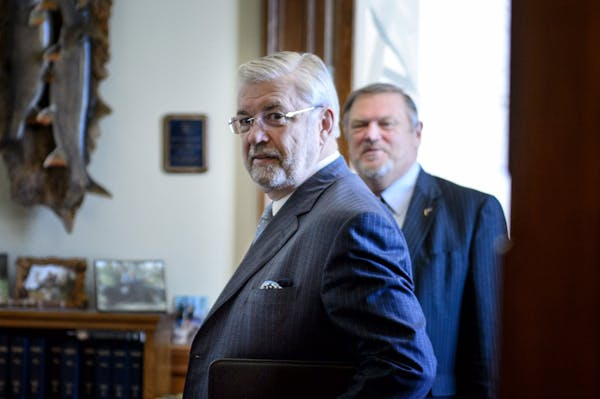Minneapolis Mayor Betsy Hodges doubled down Wednesday on her rejection of a plan to provide tax breaks for a new professional soccer stadium, calling the request from the team's owner unprecedented and "extraordinary."
The mayor's comments came a day after Minnesota United FC owner Dr. Bill McGuire laid out a plan that calls for the venture's owners to chip in $250 million to cover the land purchase, a franchise fee and the construction of the new stadium near downtown. It also includes a sales tax exemption for building materials — estimated to add up to about $3 million — and a property tax exemption.
Hodges dismissed McGuire's suggestion that the plan includes "no public subsidy whatsoever," and said she and other city leaders have not been provided with enough information to assess the full cost of the project to taxpayers.
"If people want to debate the merits of this public subsidy, let's do that," she said. "But we've got to start with the accurate information that what they're asking for is a public subsidy."
In a blog post and in comments to the Star Tribune, the mayor said the deal would be a first for Minneapolis.
All of the other major sports facilities in the Twin Cities have been granted property tax exemptions and several have received sales tax breaks, along with considerable direct subsidies. But the mayor said the soccer stadium is a different situation. It would be privately owned, unlike the others, which have public backing.
"There's no precedent for a private development being exempted from paying their fair share of property taxes in perpetuity," Hodges said. "There's just not."
It's unclear exactly how much property tax revenue is at stake. Owners of the three parcels that make up the proposed stadium site, between Target Field and the Farmers Market, now pay a combined total of about $343,000 in city and county property taxes each year.
Also uncertain is whether the group pitching the stadium plan will move forward without the tax breaks. If the proposal does advance, it will likely need the approval of the City Council, whose members appear to be split on the issue.
Council Member Blong Yang, who represents the area where the stadium would be built, remains convinced that the plan is a good deal.
"I'm a little bit surprised that [the Mayor's Office is] coming out so strongly on that," he said of Hodges' comments. "We'd love to hear what the mayor has planned for that site, if not this soccer stadium."
Council President Barb Johnson has said she's open to the idea, reopening a long-standing divide with Hodges over stadium subsidies. Council Member Jacob Frey said he's generally supportive of the idea and excited about the development, but is also interested in a careful comparison of how much will be lost in property taxes and how much will be gained in other new revenues.
Others aren't convinced.
Council Members Lisa Bender and Cam Gordon both said they are skeptical of supporting sports venues with public subsidies, but need more specifics on the property tax exemption before casting their votes.
Gordon said the soccer organizers should look to the state if they want public help, because Minneapolis is already carrying a heavy burden for facilities like the Vikings stadium, which is meant to be a regional draw.
"After so much of this football stadium being put on the backs of Minneapolis shoppers and residents, I can't believe we'd consider putting the next stadium on our backs as well," he said.
Council Member Andrew Johnson said he's in favor of a new stadium — so long as it is entirely privately financed. He said it's possible the request for tax breaks could add up to more than $10 million, the amount in the city charter that triggers a referendum for financing of sports facilities.
Such a referendum, however, has never occurred. In the case of the Vikings stadium subsidy, the state overrode the provision.
City Attorney Susan Segal said she's not sure how the property tax exemption would fit into the referendum requirement.
Either way, Johnson says he'll honor the referendum.
If council members vote to approve the tax breaks, the mayor could override the decision. Nine of the council's 13 members would need to vote to override a mayoral veto.
Hodges declined to say Wednesday if she would veto such a decision.
Erin Golden • 612-673-4790

Gun safety bills may hinge on one senator's fate despite House support, likely passage
Ethics committee dismisses complaint against Missouri speaker
GOP leaders still can't overcome the Kansas governor's veto to enact big tax cuts
Politicians and dog experts vilify South Dakota governor after she writes about killing her dog

